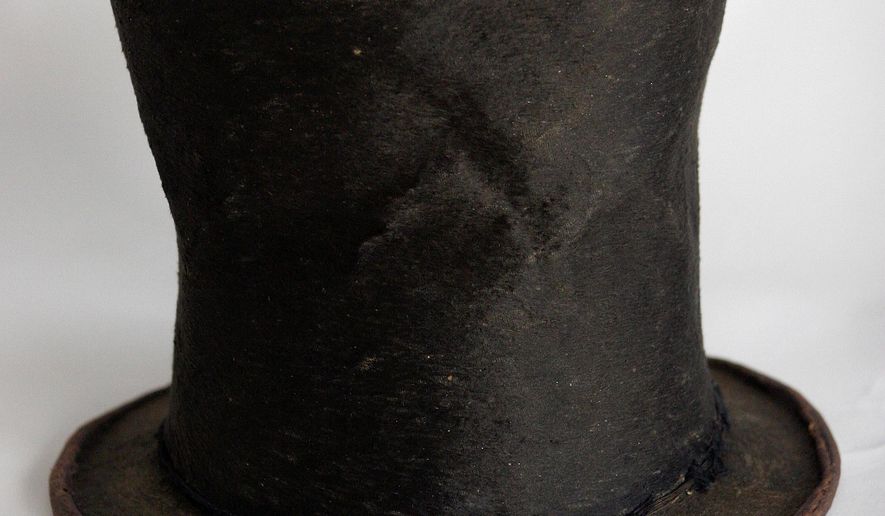SPRINGFIELD, Ill. (AP) - In 2007, Springfield’s gleaming new shrine to Abraham Lincoln was open, but it lacked touchstone pieces to show off, so organizers paid $6.5 million for the most symbolic Lincoln artifact available: one of the 16th president’s stovepipe hats.
A dozen years and as many studies and hand-wringing public statements later, there’s no concrete evidence that the felted beaver-fur hat ever sat atop Lincoln’s 6-foot-4 frame.
Has anyone requested a refund?
No, and it doesn’t appear anyone will soon. The foundation that bought the hat as part of a 1,500-piece, $23 million deal with California collector Louise Taper is not considering action, vice chairman Nick Kalm said. It’s supporting further research directed last week by Ray LaHood, chairman of the newly organized trustees of the Abraham Lincoln Presidential Library and Museum.
LaHood, former U.S. transportation secretary and congressman from Peoria, formed a committee to oversee continued study by state historian Samuel Wheeler, whose December report after 16 months of research on the hat’s connection to the Great Emancipator was inconclusive.
“That has to be done,” LaHood said. “We’re trying to get to some finality on the authenticity of it so we can move forward from there.”
He would not comment on the prospect of renegotiating with Taper, whom The Associated Press was unsuccessful in contacting for comment. Legal experts all but rule out successful court action, and while there’s the possibility of appealing to the seller through moral suasion, few are of a mind to do it.
“They could ask, she wouldn’t have to do it,” said former Gov. Jim Edgar, foundation board chairman at the time of the purchase. “She thought it was authentic. … The consensus was this was the most important privately held Lincoln collection in the world.”
The hat came from a former state legislator in southern Illinois whose father claimed he received it from Lincoln during a visit to Washington in 1861. The legislator’s widow sold it for $1 in 1958 to an antique store, where it was retrieved by James Hickey, a one-time state historian who was among the nation’s foremost Lincolniana experts. It rode in a special car on the 1975-76 Bicentennial American Freedom Train that crisscrossed the country, traveled on a late 1980s trade mission to Asia with then-Gov. James Thompson, and more than once served as the receptacle for a drawing to determine which political party would craft legislative district maps.
Taper bought it from Hickey for an undisclosed amount in 1990, and experts representing the foundation did little additional work to authenticate the hat before the 2007 transaction, which included Taper’s donation of $2 million in items. News reports by the Chicago Sun-Times and WBEZ Radio later raised questions about the hat’s provenance. The foundation’s difficulty in retiring about $8.8 million remaining on the loan - and its 2018 claim that it might have to sell parts of the collection to retire the debt before negotiating an extension - kept the hat in the headlines.
Even if statutes of limitations didn’t limit the chances for successful legal action, experts said there are other problems. Illinois buyers passed up the chance to verify Taper’s claim of the Lincoln link pre-purchase. Courts typically regard statements of authenticity as opinion, not fact, and “a buyer cannot sue on that basis,” said Patty Gerstenblith, a DePaul University law professor and director of DePaul’s Center in Art, Museum and Cultural Heritage Law.
To prove fraud, a court would need evidence of “intention to deceive,” said Leila Amineddoleh, a New York City lawyer specializing in art, cultural heritage, and intellectual property law. No one alleges deception.
“Has the museum reached out to Louise to demand a refund and rescission of the purchase agreement? Seeing that she is well-known in this area, she should want to protect her reputation by refunding the money,” Amineddoleh said.
There’s a hardball approach, too. The negative publicity and potential price of a threatened lawsuit might prompt Taper to “have the good sense and moral compass to return the money to the museum,” Amineddoleh said.
Taper, who spent decades poring over catalogs for precious Lincoln relics and gobbling them up at auctions, has been on the other end herself. In a 2009 panel discussion about collecting Lincolniana sponsored by the presidential library in honor of Lincoln’s birth bicentennial, Taper recalled buying a note allegedly penned by President Lincoln.
“When it came to the house, it was obvious it was a forgery …. I panicked, and I called them up and I said, ‘This isn’t good, this isn’t real and I want my money back,’” said Taper, adding that she got her refund.
The idea of a refund was first floated six years ago when, amid growing questions, Illinois officials commissioned a brief assessment of the hat by experts from the Smithsonian National Museum of American History and the Chicago History Museum. Lacking better evidence, the historians suggested asking Taper to take the hat back or make it a donation.
“This would shine a positive light on a generous donor who believes in the history of the hat and removes the cloud that the museum purchased a very expensive item without thorough documentation,” they wrote.
Of course, pressing too hard could poison a previously harmonious relationship with Taper, who’s still collecting. In the 2009 discussion, when a panelist mentioned Taper’s sale and donation to the Lincoln museum, she added, “There’s a lot more in the future.”
___
Online
State historian’s December 2019 report on the stovepipe hat: https://bit.ly/2GkvrAN
___
Follow Political Writer John O’Connor at https://twitter.com/apoconnor.




Please read our comment policy before commenting.